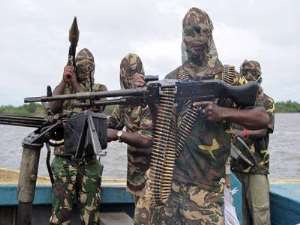
Boko haram's small wars have fallen upon hard times for Nigerian democracy. This week, a swathe of opinion from reformists to warmongers against terrorists on Nigerian shores was nearly swinging the polls back and forth along a stampede of support for the candidate who will show enough a rare combination of intelligence and political acumen to bringing a new audacity of hope and peace for the West African giant.
The taxonomies of local politics came to the concluding argument that it will take the charism of a political albino to confront Nigerian corruption and violence so deeply moored in history. The elections' outcome was tinged by the very utopia that Muhammadu Buhari seeks to challenge.
Etched into much public opinion is the notion that it will take a strong muslim to challenge Boko haram. And the mantle of military power along the very image of an economic reformist are to be yoked to win the political battle. This ticklish national expectation touches deeper questions about the eclipse of Nigerian power in West African political frontiers.
Yet, President Goodluck Jonathan presented the nation with a political hologram that brought about a blurred policy agenda for his electoral basis. Goodluck's war on terror climaxes on a prolonged national elegiac novel not appealing for public reading. At his own risks, Goodluck took upon his shoulders the war on terror to be the true “sport of kings”. Refusing to wage war would have suggested otherwise to Boko Haram that the king has grown soft. Thus, he converted into the full fledged apostle of Pax Nigeriana via a regional coalition with Chad and Niger by way of snuffing out terrorism on Nigerian soil.
Spicing up his political leadership by giving it a martial veneer against Boko Haram was a political miscalculation. Chasing terrorists has no end and offers little victory to celebrate about. Not surprisingly, Goodluck's regional military lackeys turned out not becoming the expected political fine calibrated pawn. Coalition forces were rather outplaying the demise of Nigerian military power and regional leadership. The glowing embers of national humiliation and discontent had been fanned by the many missteps of boko haram politics. Goodluck's leadership flirted with policies so filled with political gravity-defying failures.
Squeaking out a strong vote margin victory, M. Buhari abstained from the obsessive coverage of Boko haram fearmongering tactics. Though his conventional military experience could have been emphasized as a political liability, he rather dovetailed a core national interest of a reformist agenda as the keystone of Nigerian strategy to regaining its political leadership standing in the region. Indeed, Abuja should not be misguided by a narrow perception of war. Defeating Boko haram's field troops would not put an end to hostilities.
The war of radical Islam is wrapped up with local and global black markets via the routes of organised crime. Today, one should not be misled to forget that fighting under the banner of modern jihadists has become a cloak for criminal ambitions. Rightly so, putting back Nigeria on the path to economic reform is the prime challenge against the terror network.
Narcisse Jean Alcide Nana
Author of the book, Démilitariser l'Economie (Paris, Edilivre 2014)




 Saglemi Housing Project will not be left to rot – Kojo Oppong Nkrumah
Saglemi Housing Project will not be left to rot – Kojo Oppong Nkrumah
 Transport fares hike: GPRTU issue two-day ultimatum
Transport fares hike: GPRTU issue two-day ultimatum
 ARC endorses Alan as presidential candidate – Buaben Asamoa
ARC endorses Alan as presidential candidate – Buaben Asamoa
 Akufo-Addo appoints Kwasi Agyei as new Controller and Accountant-General
Akufo-Addo appoints Kwasi Agyei as new Controller and Accountant-General
 PNC dismiss reports of mass resignations
PNC dismiss reports of mass resignations
 PAC advocates for revenue collectors to be engaged on commission basis, not full...
PAC advocates for revenue collectors to be engaged on commission basis, not full...
 Genser Energy commissions 110km of natural gas pipeline at Anwomaso
Genser Energy commissions 110km of natural gas pipeline at Anwomaso
 Naa Torshie calls for tolerance, peace ahead of 2024 election
Naa Torshie calls for tolerance, peace ahead of 2024 election
 Asantehene commends Matthew Opoku Prempeh for conceiving GENSER Kumasi Pipeline ...
Asantehene commends Matthew Opoku Prempeh for conceiving GENSER Kumasi Pipeline ...
 Let’s do away with ‘slash and burn politics’ in Ghana — Dr Adutwum
Let’s do away with ‘slash and burn politics’ in Ghana — Dr Adutwum
